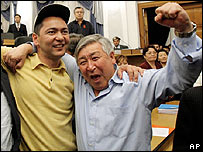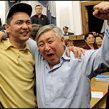
OPPOSITION CELEBRATES AS NEW CONSTITUTION ADOPTED IN KYRGYZSTAN
Publication: Eurasia Daily Monitor Volume: 3 Issue: 208
By:

On November 8 the Kyrgyz opposition bloc “For Reforms” finally managed to broker a compromise between the parliament and President Kurmanbek Bakiyev to endorse a new constitution that considerably empowers the legislative branch and strips the president of key prerogatives. Despite earlier outbreaks of violence between the opposition and government-hired crowds at Bishkek’s central square, the almost week-long confrontation between Bakiyev and the opposition was yet another manifestation of Kyrgyzstan’s move towards a democratic state with high rates of civic engagement.
During the demonstrations, which began November 2, the opposition was able to mobilize more political actors and members of the Kyrgyz public into heated debates on the new constitution. The delays and difficulties encountered in the process of adopting the new constitution only contributed to its legitimacy. However, Bakiyev’s stubborn determination to carry out constitutional reform unmasked his private ambition to hold on to power at any cost instead of seeking an optimal state structure. These ongoing tensions harmed Kyrgyzstan’s economy.
Earlier this week 42 parliamentarians, representing a simple majority, voted for a new constitution that would secure more powers for parliament and strip the president of major privileges. However, all branches of power in Kyrgyzstan discussed whether or not a simple majority is sufficient for promulgating a new constitution. The president loudly insisted that the parliament’s move was illegal, calling it actions a “usurpation of state power.” He insisted that agreement by at least two-thirds of the 75-member parliament is necessary for a new constitution to be adopted and proposed his own constitutional project. The parliament agreed to president’s conditions and, after heated debate, more MPs agreed to vote in favor of the new constitution. The president’s draft was ignored except for a few amendments.
The new constitution contains several major innovations:
– Parliamentary elections will be carried out with a mixed voting system, whereby 50% of seats will be distributed according to party lists.
– If one party wins over 50% of seats in the parliament, it will form the government. Otherwise, the president will be entitled to form the government.
– Parliament will be increased from 75 members to 90, with by-elections to fill the new seats.
– The president will appoint the head of the Central Bank, the Central Election Commission, and the prosecutor-general only after parliament’s approval.
– The National Security Service will be under the government’s control.
– The parliament will have more powers regarding economic issues.
Some Kyrgyz experts criticize this model, claiming that even in European democracies parties are often unable to gain a parliamentary majority and, since no political party dominates in Kyrgyzstan, the president will always be the winner. Others, however, argue that political parties will be forced to enter coalitions in order to increase parliament’s influence. The new constitution should also encourage political party formation and allow women and candidates with weak economic backgrounds to win elections.
Bakiyev vehemently opposed granting parliament such an array of powers. He especially condemned the president’s lack of ability to form the government and, as was proposed in earlier drafts, to appoint local judges. Instead, he gathered hundreds of public employees and staged music concerts at Bishkek’s central square to demonstrate support for his government. To prove his international standing, Bakiyev spoke on the telephone with the Kazakh, Uzbek, and Russian presidents about various issues. After such a shift of powers, a weakened Bakiyev may be keen to rely on Russian support.
Both Bakiyev and Prime Minister Felix Kulov paid a heavy political price for their struggle with the opposition. Neither of them can now hope for reelection in 2010 or even to recover the former public approval ratings. The stability of their political partnership and the parameters of the old constitution suddenly generated sources of instability in the country. But the fact that Bakiyev and Kulov continued to cooperate in the face of opposition pressure also confirmed that one cannot survive without the other.
The Kyrgyz police displayed a high degree of professionalism in maintaining order among the crowds. In general, Kyrgyz security and law enforcement structures and officials, although dealing forcefully with the crowds, tried to avoid lethal force. The head of the National Security Service, Murat Sutalinov, who at the peak of the tensions threatened to disperse the opposition with force, has publicly admitted that he succumbed to his emotions and regrets acting so aggressively.
By all measures, the ongoing instability in Kyrgyzstan represents a significant political change. While it is easy to misinterpret events in Kyrgyzstan as being signs of a failing state, the opposition has behaved bravely, constructively, and in a quite organized manner. According to various reports, For Reforms finances their activities through investments by the bloc’s key leaders, many of whom have backgrounds in business.
It remains to be seen whether the new constitution will in fact prevent the current and future Kyrgyz presidents from authoritarianism and corruption, empower the parliament, and make the judiciary system more independent. However, the November 8, 2006, Constitution of the Kyrgyz Republic is one of the most progressive documents in the Central Asian region and among all former Soviet states. In this context, the role of the March 24 Tulip Revolution in 2005 is significant. It reassured Kyrgyz political actors that joining forces and acting within the law would encourage the central government to compromise. Furthermore, while Bakiyev’s regime was on the brink of collapse, both the government and the opposition avoided a complete failure of the state apparatus.
The November 6 presidential elections in Tajikistan offer a far different model than the developments in central Bishkek. Although OSCE observers assessed the Tajik elections as largely rigged, neither domestic nor international actors are strongly protesting their legitimacy. The Tajik population’s massive support for President Emomali Rakhmonov’s corrupt regime exhibits a stark contrast with the Kyrgyz public, which has developed an extremely critical perspective and high expectations from its political leaders. As one Kyrgyz scholar noted, “What’s happening in Kyrgyzstan now should in fact take place in Tajikistan.”
Not having experienced modern statehood and democratic governance, Kyrgyzstan now appears to be in the process of forming a new political culture. “Clashes between opposition and the government are [signs of a] state-in-the-making,” comments one Kyrgyz political observer. The opposition has once again triumphed over the corrupt government and managed to pool enough supporters between both parliament and public to implement major changes in the state. The fireworks that illuminated central Bishkek on November 8 mark another important date in Kyrgyzstan’s young history.




